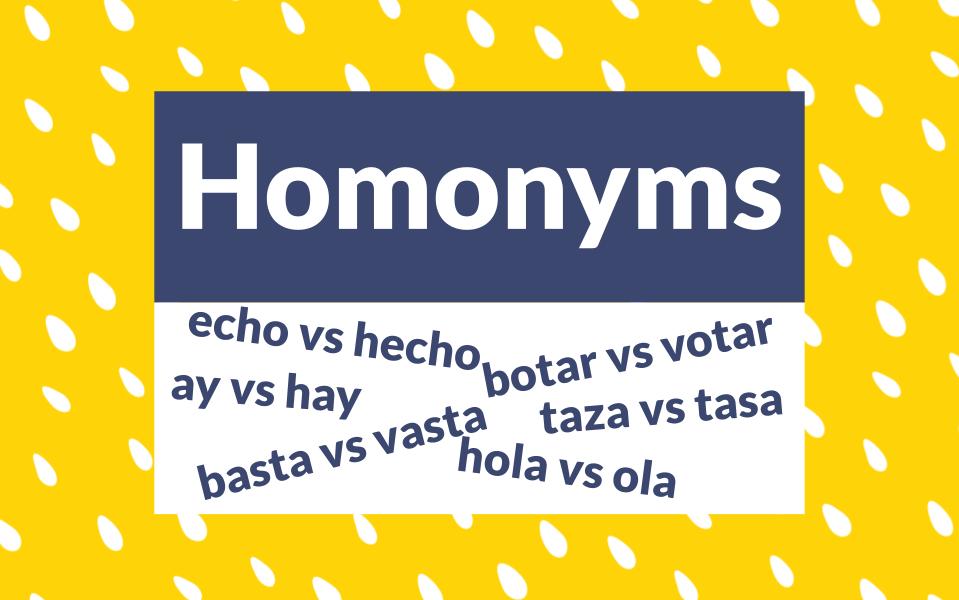Spanish homonyms: Similar Spanish words with different meanings

Get our free email course, Shortcut to Conversational.
Have conversations faster, understand people when they speak fast, and other tested tips to learn faster.
More infoJust like in English, we have many Spanish homonyms, which are words that are pronounced in the same way but have different meanings. In some cases, they are written in the same way, while others have different spellings. In English you have such words as to train and a train, or root and route.
When the words sound the same but they are written in different ways, these are called homophones. For instance in English, write and right. We’ll focus on Spanish examples of homophones in this post.
Likewise, we can find words that are spelled the same but have different meanings, these are homographs. Some examples in English may be: to park and a park, a tear and to tear.
Homonyms are common in Spanish and can create confusion for both native and non-native speakers. In today’s post, we will concentrate on Spanish homophones that are spelled differently but are pronounced the same. We will provide examples that will help you better understand these Spanish homophones and how to use them correctly.
So without further ado, let’s learn all about Spanish homonyms!
Spanish Homonyms: Homophones in Spanish
As we mentioned above, there are two types of homonyms, both of which are pronounced identically: homographs are spelled the same way but have different meanings, whereas homophones have different spellings. Our focus in this post is on Spanish homophones.
You’ll notice that for a few of these Spanish homophones, the only spelling difference is an accent mark. Still, as we explain in our post on Spanish accent marks, this makes them two distinct words!
Baya vs Vaya
Berry vs To go (conjugated in the imperative mood to tú, and in the subjunctive mood to yo and tú)
- En el jardín de mi abuela hay muchas bayas. – In my grandma’s garden there are many berries.
- Usted no vaya a esa fiesta, está prohibido. – Don’t you go to that party. It’s forbidden.
- Que yo no vaya a tu casa no quiere decir que no me guste. – The fact that I don’t go to your house doesn’t mean I don’t like it.
Basta vs Vasta
Enough vs Extensive (feminine)
- ¡Basta de hablar! – Enough talking!
- El empresario cuenta con una vasta experiencia en la industra textil. – The businessman has extensive experience in the textile industry.
Errar vs Herrar
To err (infintive) vs To shoe a horse (infinitive)
- Errar es humano. – To err is human.
- Matías tuvo a herrar a todos los caballos en el campo. – Matías had to fit horseshoes on all horses in the countryside.
Cabo vs Cavo
A corporal (military rank) vs To dig (cavar, conjugated in present to yo)
- El cabo Fernández no vino a la oficina hoy. – Corporal Fernández didn’t come to the office today.
- Yo cavo un hoyo en mi jardín para mis flores. – I dig a hole in my garden for my flowers.
Calló vs Cayó
To silence (callar, conjugated in preterite to él/ella) vs To fall (caer, conjugated in preterite to él/ella)
- De repente, el niño se calló. – All of a sudden the kid went silent.
- Julia se cayó del árbol. – Julia fell down from the tree.
Bello vs Vello
Pretty (masculine) vs Body hair
- Leímos un libro muy bello. – We read a pretty book.
- Ya no le queda más vello en el cuerpo. – He has no hair left on his body.
Botar vs Votar
To bounce (infinitive) vs To vote (infinitive)
- Los niños estuvieron botando la pelota toda la mañana. – The children were bouncing the ball all morning long.
- Los ciudadanos estuvieron votando en todo el territorio esta mañana. – The citizens were voting throughout the territory this morning.
Echo vs Hecho
To fire (echar, conjugated in present to yo) vs To do (hacer, in past participle form), or Fact
- Si vuelves a llegar tarde, te echo. – If you arrive late again, I’ll fire you.
- ¿Qué has hecho últimamente? – What have you done lately?
- El hecho es que hemos solucionado el problema. – The fact is, that we’ve solved the problem.
Barón vs Varón
Baron (a nobility title) vs Boy, Male
- El barón de Montesquieu era muy famoso en la región. – Baron Montesquieu was very famous in the area.
- No existen los juegos para varón ni para nena. – There are no games for boys nor girls.
Honda vs Onda
Deep (feminine) vs Wave
- ¡Qué piscina honda! – What a deep pool.
- El sonido viaja por ondas. – Sound travels in waves.
El vs Él
The (masculine definite article) vs He (masculine subject pronoun)
- No encontramos el martillo verde en la caja. – We didn’t find the green hammer in the box.
- Él siempre quiere ducharse por la noche. – He always wants to shower at night.
Revelar vs Rebelar
To reveal (infinitive) vs To rebel (infinitive)
- Los periodistas no revelaron sus fuentes. – The journalists didn’t reveal their sources.
- Los niños se rebelaron ante la injusticia en la escuela. – The children rebelled against injustice at school.
Hola vs Ola
Hello vs Wave
- ¡Hola! ¿Cómo estás? – Hello! How are you?
- El surfista montó una ola enorme. – The surfer rode a huge wave.
Ay vs Hay
A common interjection vs There is, There are
- ¡Ay, qué dolor! – Oh, what a pain!
- Hay un gato en el techo. – There’s a cat on the roof.
Rayar vs Rallar
To scratch (infinitive) vs To grate (infinitive)
- Martín rayó el auto con la bici. – Martín scratched the car with his bike.
- Martín ralló el queso en un plato. – Martín grated the cheese on a plate.
Taza vs Tasa
Cup vs Rate
- Me gustaría un café en una taza grande. – I would like a coffee in a large cup.
- La tasa de interés es del 3%. – The interest rate is 3%.
Casa vs Caza
House vs Hunt
- Hoy vamos todos a casa de Juan. – Today we all go to Juan’s house.
- Mi abuelo va de caza todos los años. – My grandpa goes hunting every year.
Té vs Te
Tea vs You (object pronoun), Yourself (reflexive pronoun)
- No quiero tomar té hoy. – I don’t want to drink tea today.
- Te quiero mucho. – I love you so much.
- No te preocupes por eso. – Don’t worry [yourself] about it.
Cómo vs Como
How (question word) vs Like, As (for making comparisons)
- ¿Cómo está tu madre? – How’s your mother?
- Me gusta la música pop, como la de Madonna. – I like pop music, like Madonna’s.
You’ll find more details and examples of this Spanish homonym in our dedicated post on como vs cómo.
Qué vs Que
What (question word) vs That (connecting word), That, Which, Who, Whom (relative pronoun)
- ¿Qué hora es? – What time is it?
- Creo que Dante llegará tarde. – I think that Dante will arrive late.
- Esta es la chica que amo. – This is the girl who I love.
Tú vs Tu
You (singular familiar subject pronoun) vs Your (possessive adjective)
- Tú eres muy importante para mí. – You’re very important to me.
- ¿Me prestas tu tijera? – Will you lend me your scissors?
Sé vs Se
To know (saber, conjugated in present to yo) vs himself, herself, yourself, yourselves, themselves (reflexive pronoun), accidental reflexive
- Yo sé que no tienes dinero. – I know you have no money.
- Los chicos se lavan las manos siempre. – The children always wash their hands.
- Se me cayó el teléfono. – I dropped my phone [by accident].
Mí vs Mi
Me (prepositional pronoun) vs My (possessive adjective)
- El regalo es para mí. – The gift is for me.
- Mi casa es grande. – My house is big.
Aún vs Aun
Still, Yet vs Even
- Aún no he terminado mi tarea. – I haven’t finished my homework yet.
- Aun así, continuaré trabajando. – Even so, I will continue working.
For this pair of Spanish homophones, we have a full-on anti-confusion guide to understand aún vs aun vs aunque.
Conclusion
In this post, we’ve covered almost 25 different pairs of homophones in Spanish. For each one, we saw the different spellings and meanings of these words that otherwise sound the same.
As you may have noticed, Spanish homonyms are present all over the range of word categories: verbs, nouns, pronouns, adjectives, and even interjections.
Keeping the differences clear between these various homophones in Spanish is invaluable, as using the wrong one can completely change the meaning of whatever you’re trying to say. This is particularly important to prevent mistakes in writing.
We hope this comprehensive list helps you distinguish between all of these homophones in Spanish. Not to mention to put them into practice.
And speaking of practice, why not do some exercises? See how you do with this final section!
Exercises
Choose the right Spanish homonym to complete the sentences.
1. No quiero que Luis (vaya / baya) al colegio hoy.
2. Charly (cayó / calló) de un octavo piso.
3. El nadador no tenía nada de (vello / bello).
4. La (honda / onda) expansiva rompió los vidrios.
5. ¿(Hay / Ay) estrellas en el cielo?
6. Yo (se / sé) mucho sobre astrología.
7. La película no ha terminado (aun / aún).
Answers
1. No quiero que Luis vaya al colegio hoy. – I don’t want Luis to go to school today.
2. Charly cayó de un octavo piso. – Charly fell from an eighth floor.
3. El nadador no tenía nada de vello. – The swimmer didn’t have any body hair.
4. La onda expansiva rompió los vidrios. – The shock wave broke the windows.
5. ¿Hay estrellas en el cielo? – Are there stars in the sky?
6. Yo sé mucho sobre astrología. – I know a lot about astrology.
7. La película no ha terminado aún. – The movie hasn’t ended yet.



